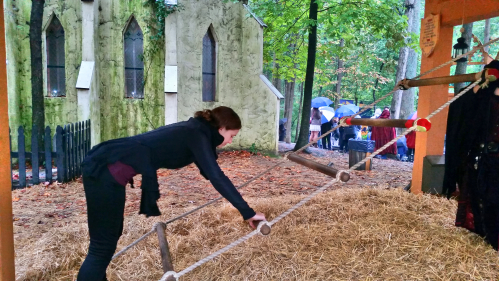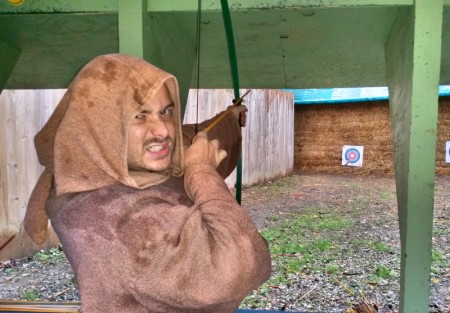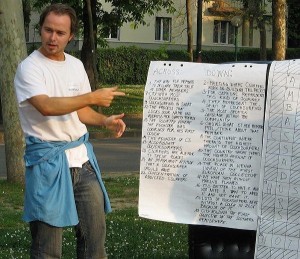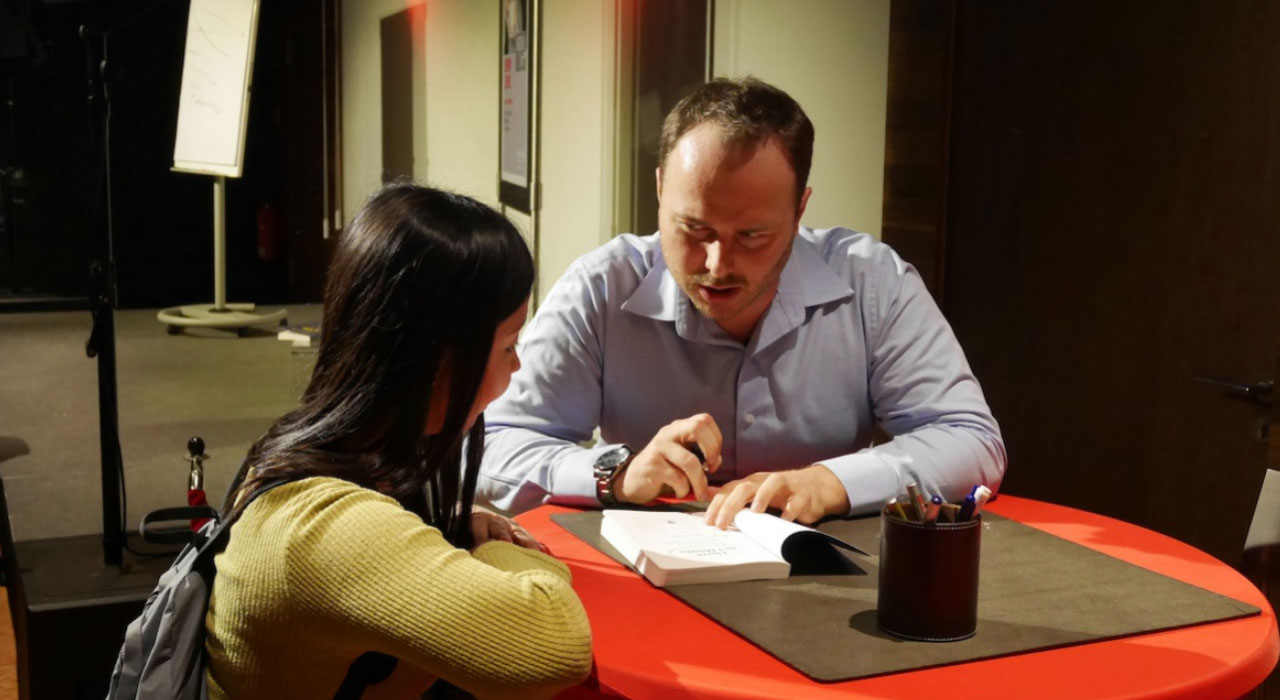A Powerful and Underrated Beginner Language Goal
Why is language learning all about the intermediate or advanced levels?
When you start learning a new language, it’s easy to get carried away with huge, unrealistic goals. Maybe you dream of having deep conversations in your target language, or of reading advanced novels, or making play-on-word jokes. You may even want to talk about technical subjects for your work.
To do those things, you’d need to reach what’s often called a C2 level, also known as “mastery”. The C2 level is based on the awkwardly titled Common European Framework of Reference for Languages (CEFR). The CEFR levels are:
- A1 Beginner
- A2 Upper Beginner
- B1 Lower intermediate
- B2 Upper intermediate
- C1 Advanced
- C2 Mastery
The C2 or Mastery level in a language is a wonderful thing to reach one day. The only problem is that it’s an extreme reach barrier. It’s so far from where you’re at now, it can feel like it’s pointless to learn anything. That’s really demotivating.
Language learners have realised this, and lots of learners (including many in the Fluent in 3 Months community) start by aiming for the B-levels.
Sounds sensible, right?
Well… maybe. But by aiming for a B-Level goal, there’s an entire language-learning level you skip over.
So why do so many language learners jump over the A-levels when setting goals? Are they that meaningless? If you speak A2 level Spanish, doesn’t that mean you’re simply a beginner?
No and no!
The A levels (“beginner” levels) are severely underrated. I think they should actually be the most common serious milestones for beginners to think about, long before they start worrying about advanced skills in their target language.
With this approach, you’ll have a much easier-to-achieve milestone system, that may indeed lead to mastery later. But for now, let’s have fun with the beginner levels!

Why Level A2 Is Underrated and Overlooked
As you’ve seen, with the CEFR system, the A-level are the beginner levels. The B-levels are intermediate. The C’s are advanced. Within each one you have 1 (lower) and 2 (upper). So that would make A2 an “upper beginner”.
…And this terminology can be seriously misleading.
You hear the term beginner levels and it feels like you’re no better off at the A2 stage than you were the very first time you ever opened a language learning book.
If you’re a beginner the first time you ever uttered your first tone in Chinese or butchered your first word in German, and you’re still a “beginner” weeks or months later when you’ve reached the A2 level… then what gives?
The truth is that levels A1 and A2 are completely distinct phases in your language learning journey. You can do things at level A1 that you could only dream about on Day 1. And when you’ve hit level A2, you’ve already covered serious ground, and can even begin to have conversations!
Each of these levels is a big milestone. Each time you reach one, you can safely say that you’ve gained a totally new set of skills in new language. Don’t overlook these stages. Celebrate them!
Why You Should Consider Making A2 Your First Language Goal

I like the idea of setting an A-level target because it’s attainable in the short-term.
When reaching your goal is many months or even years away, it’s so easy to drag your feet, to make slower progress than you need to, or to lose interest or motivation entirely. This happens all too often in language learning.
But you can reach level A2 relatively quickly, and that feeling of success will give you an immense boost. Don't underestimate the buzz you'll get from reaching this goal, and how much motivation-mojo that can give you to keep on learning the language.
Even if you choose to stop at A2, you’ll find that what you’ve learned is really useful. Far from being a simpleton who can only talk about the weather, the A2 level is your window to being able to get to know new people, tell them about yourself and learn about them. At level A2, you can make friends. You can enjoy comics and cartoons. And you can laugh and even feel at ease in the language.
There will of course be a lot of things you still can’t do. You may not be able to talk with a random in-a-hurry native speaker, but you can absolutely find patient speakers who love talking to learners and will be very friendly and helpful, and you will feel yourself having real conversations with them.
Once you’ve hit A2, you can now truly communicate your thoughts, questions, or ideas to a whole new world of people. How cool is that? Very worthy as a project in and of itself!
How Do You Know What Level You're At?
This is a hotly debated topic, and you'll never find a perfect consensus for what any of the levels on the European Common Framework look like. That said, if you look at the various definitions, you can find some common threads.
To me, A2 is the level where a conversation can finally happen, as long as you accept that it will be slow, and you will have to use “crutches”.
As a total beginner, you know next to nothing. You have what seems to be a mountain of vocab and phrases and grammar rules ahead of you. But then, before you know it, you’re at A1. Here you can introduce yourself, and you can ask and answer direct questions (but you’ll start to get lost at any conversation past that).
Enter level A2. This is where your conversational flow begins.
Here, you can have (messy and imperfect, but effective!) exchanges with people that last several minutes, even if you’re still turning to your dictionary now and again. The other person will need to be patient with you, but they will get the gist.
I asked the team behind Fluent in 3 Months their thoughts on level A2, and here’s another point of view I got on this:
I'd say at A2 you'd need to be able to get by, but I don't think you should be able to cover lengthy discussions, even in basic form. To me, that starts at B1. Of course you can have exchanges as Benny put it, but the key here is that the other person needs to be VERY patient with you, this is why it's key to pick a great partner.
And of course, there’s the official definition of the A2 level:
-Can understand sentences and frequently used expressions related to areas of most immediate relevance (e.g. very basic personal and family information, shopping, local geography, employment).
-Can communicate in simple and routine tasks requiring a simple and direct exchange of information on familiar and routine matters.
-Can describe in simple terms aspects of his/her background, immediate environment and matters in areas of immediate need.
With all of this, you can start to get a good idea of what this level truly means (as well as what it doesn’t). At the end of the day, there is so much more to being an “advanced beginner” than meets the eye!
Here’s Your Simple Roadmap for Reaching Level A2

How can you reach level A2, if you’re starting from scratch as a total beginner?
I like to break my language projects into mini-missions. And I get a lot of questions about how exactly I do that. How do I decide which mini-mission to take on next? Which mini-missions are good to start with?
In light of that, here's a cheat sheet you can use on your own quest towards A2 level in your next language project. Starting from zero, complete each of these “mini-missions”, practice them often with your language teacher or partner, and you'll be well on your way.
This is the exact same system that Lauren has been using in her Russian project (which is now back on track after her big surprise). You can see her implementing some of these steps in her Week 8 Russian update video coming in a few days on our Youtube channel.
Mini-Missions from 0 – A1
- Learn a you-specific intro by heart. Use that as the answer when your teacher or language exchange partner asks you to talk about yourself.
- Listen to the absolute beginner and A1 level podcasts (the Innovative Language series is my favourite) to get listening comprehension, and to get used to the very basic questions you’re likely to be asked at this level.
- Have a quick exchange on the HelloTalk app. These are low-pressure chats where you can stop to look things up in a dictionary. This is your first (very important) experience in actually using the new language!
- Study basic vocabulary decks on Anki, and find fun mnemonics on Memrise, so I have specific words at the ready.
- Prepare your cheat-sheet for everything you may want to say for a basic introduction conversation, and have it handy. Read through it so you are relatively confident about pronunciation, and paste words you don’t know into Forvo.
- Cram as much as you can and have a live conversation with a native speaker (30 minutes max!) on italki (our review is here), so you can use what you know in real life. Rely on a dictionary to help move the conversation forward (see how I did this with Polish here).
What you CAN’T do yet (and shouldn’t expect from yourself) at this level
- Have exchanges that last more than 20 or so seconds
- Pronounce most words correctly
- Understand most of what that the other person says to you, beyond questions you may be ready for. That’s what Google Translate is there for!
- Form your own sentences (use your ready-made scripts for now)
- Talk about the other person or many things about your environment beyond very quick (prepared) descriptions
Mini-Missions from A1 – A2
- Learn vocabulary specific to your environment or what you do everyday. For me, here I start to learn vocab about travel or work on my blog. For Lauren, she started learning how to talk about Russian and ask questions about Russian in Russian (check it out in her Week 8 Russian update video in a few days!) Start turning things around in conversations so that you’re able to ask basic questions of your teacher or conversation partner and understand as many likely replies as possible.
- Listen to A2 level podcasts so your listening comprehension is brought up to this level.
- Try to expand your decks on Anki to cover more subjects, while still limiting them to things you’d be more likely to talk about often. Spend lots of time absorbing vocabulary.
- Flick through a grammar book, and look only at parts that feel non-intimidating and can help you express a point that has been making the language seem hard. Don’t actually study it (that’s for B levels). I suggest you look into verb conjugation and possibly past or future tense at this stage.
- Since there are many things you’ll want to say, but you’ll feel limited by grammar issues, learn conversational connectors to help your chats flow better. Try to use your words to form sentences that are comprehensible (grammatically correct isn’t important yet).
- Every single day, or every other day, get on Skype through Preply and chat with a native speaker. Cram what you can before each session, but after each one make notes of what your biggest issues are, and create a new mini-mission to try to solve that problem. Repeat!
What you CAN’T do yet (and shouldn’t expect from yourself) at this level
- Understand half of what the other person says to you. At this point, you’ll likely recognize about 1 out of every 3 words.
- Pronounce new words correctly on the first try.
- Have a conversation with anyone – you will be ready to talk to patient natives who are used to conversing with foreigners for now
- Have a conversation about anything – like I said at the start, this level means so much more than always talking about the weather, but you can still talk about many topics. The trick is that you have to be prepared to talk about that, and study the vocabulary in advance. Conversations about random topics come later.
- Have perfect conversations. They will be messy right now, but you will be able to convey a lot of ideas.
- Produce grammatically correct sentences. Our goal at the A2 level is communication, and this requires some “Tarzan” sentences. I’d recommend tidying up your grammar at the B levels, not before.
- Understand the radio or news. You can start to enjoy cartoons or material made for learners.



Social